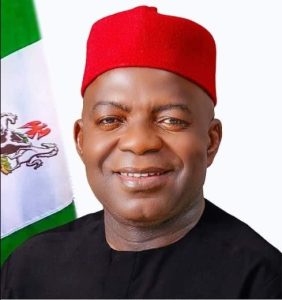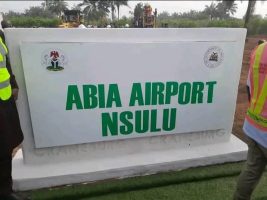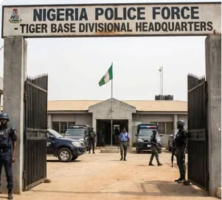By ‘Bike Ogbuokiri
The hum of construction equipment and the promise of an international airport stand in stark contrast to the simmering anger brewing within the farming communities of Umuezenta, Umuelenwa, and Okpuala in Umuomainta Mbawsi, Isiala Ngwa North Local Government Area of Abia State.
While the Abia State government touts the airport project as a catalyst for economic growth, landowners whose ancestral lands are being transformed into runways and terminals are crying foul, alleging a systematic and fraudulent acquisition process marred by opaque dealings, inadequate compensation, and a disturbing lack of transparency.
The core of their grievance lies in what they describe as a deeply flawed compensation scheme, one that has left families with meager sums for land that has sustained them for generations. “We are not against development,” Emeka Nwankwo, a community leader from Umuezenta, told this reporter during a meeting held under the shade of a mango tree overlooking the sprawling construction site. “But development should not come at the expense of our livelihoods, our heritage, and our dignity. This airport is being built on our tears.”
Governor Alex Otti, a former banker who rode into power on the wave of the “Obidient” movement, promising a new era of transparency and accountability, has repeatedly assured the public that 100 perent compensation has been paid to the landowners.

However, these assurances ring hollow to the people of Nsulu, who demand that Otti release the compensation list, detailing who was paid, how much, and according to what criteria.
The landowners’ frustrations are compounded by allegations of fraudulent entries on the compensation list. Several community leaders claim to have discovered names of individuals who are neither from their villages nor have any ancestral ties to the affected lands, including names of Yoruba origin, raising questions about potential identity fraud and corruption within the compensation disbursement process.
READ ALSO: Ubani Fights Back, Slams Tonye Jaja for ‘Baseless, Malicious Attack’
“We went to Umuahia to see the list, and we were shocked,” stated Chief Uche Nnadi, an elder from Okpuala village. “There were names we had never heard before, people with Yoruba names. How can this be? This is our ancestral land, passed down through generations. What connection do these people have? It’s a blatant attempt to siphon money that rightfully belongs to us.”
The alleged insertion of extraneous names underscores the lack of transparency surrounding the entire acquisition process. The landowners claim they were never properly consulted and that the Memorandum of Understanding, MoU, supposedly signed between the communities and the government remains shrouded in secrecy. They are demanding a copy of the MoU and the land acquisition agreement to understand the terms and conditions under which their land was acquired.
“They brought papers for us to sign in Umuahia, calling it an updated MoU and an indemnity form,” recounted Mr. Silas Ibe, a farmer from Umuelenwa, whose face bore the marks of years of sun and toil. “Many of us are not well-educated. They didn’t explain the details clearly. We were simply told to fill in our bank details and sign. Later, we received small amounts in our accounts, far less than what our land is worth.”
This sentiment of being manipulated and treated with disdain resonates deeply within the communities. Villagers who dared to travel to Umuahia to raise their concerns were allegedly intimidated by government agents, further silencing their voices and fostering a climate of fear.
“They treat us like we are nothing,” lamented Mrs. Chioma Eze, a widow who lost a significant portion of her farmland. “We are farmers, not lawyers. We don’t understand all these complicated documents. They take advantage of our ignorance and our vulnerability. Where is the justice in this?”
The situation is particularly poignant, given that Nsulu, a predominantly agricultural community, has historically suffered neglect by successive governments. Infrastructure like roads, schools, and healthcare facilities are largely non-existent, with the community relying on its own resources, earned from peasant farming, to provide essential services.
The airport project, while potentially beneficial in the long run, has also created new challenges. The ancestral stream that served as the primary source of water for the communities is being filled with sand, with no alternative water source provided by the government. Repeated pleas to reduce the size of the land acquisition have gone unheeded.
The situation highlights a disturbing disconnect between the government’s rhetoric of development and its actual treatment of the affected communities. The landowners point to the stark contrast between Governor Otti’s actions in Abia State and the recent statement made by Peter Obi, the Labour Party presidential candidate whose popularity boosted Otti’s election. Obi had called for a balance between law, justice, and compassion in handling the demolition of Aspamda Market in Lagos.
“Peter Obi spoke about compassion and justice in Lagos,” questioned Mr. Nnanna Ukandu, a youth leader from Umuezenta.
“But here in Abia, Governor Otti, who claims to be an ‘Obidient’ governor, is treating the people of Nsulu like trash. Where is the compassion? Where is the justice?”
The absence of direct engagement from Governor Otti is a major source of frustration. Since the outcry began, the governor has reportedly not visited the airport site to personally assess the situation and listen to the concerns of the landowners. Instead, he has relied on information provided by government agents, consultants, and contractors, who are accused of presenting a biased and sanitized version of reality.
READ ALSO: No Room for Complacency, Judiciary Must Deepen Reform – Ubani, SAN
“The governor has never come here to see for himself. He only listens to what his people tell him,” said Madam Okoro, her voice laced with disappointment. “If he truly cares about the welfare of the people, he would come and see what is happening with his own eyes.”
The allegations of fraud, inadequate compensation, and lack of transparency surrounding the Abia Airport Project raise serious questions about the governance of Abia State under Governor Otti’s administration. The project, intended to bring progress and prosperity, is instead sowing discord and resentment within the communities whose land is being used.
The landowners are adamant that they will not allow the airport project to proceed without a fair and just resolution to their grievances.
They are demanding:
*A full and transparent investigation into the alleged fraudulent insertion of names on the compensation list.
*A comprehensive review of the compensation assessment process, with fair and accurate valuation of land and cash crops.
*The immediate publication of the compensation list, detailing who was paid, how much, and according to what criteria.
*The provision of a copy of the MoU and the land acquisition agreement to the affected communities.
*The provision of an alternative water source to replace the ancestral stream that is being filled with sand.
*Direct engagement from Governor Otti, including a visit to the airport site to listen to the concerns of the landowners.
“We are not asking for too much,” insisted Chief Nnadi. “We are simply asking for what is rightfully ours. We want justice, transparency, and respect. We want to be treated as human beings, not as obstacles to development.”
The situation in Nsulu serves as a stark reminder that development projects must be implemented with fairness, transparency, and respect for the rights of the affected communities. Governor Otti’s legacy will be judged not by the impressive infrastructure of the airport, but by the manner in which he treats the people whose lives are being irrevocably changed by its construction. The future of the Abia Airport, and the peace and prosperity of the communities it is intended to serve, hangs in the balance. Until the voices of the landowners are heard and their grievances addressed, the promise of progress remains a hollow echo in the fields of Nsulu.






